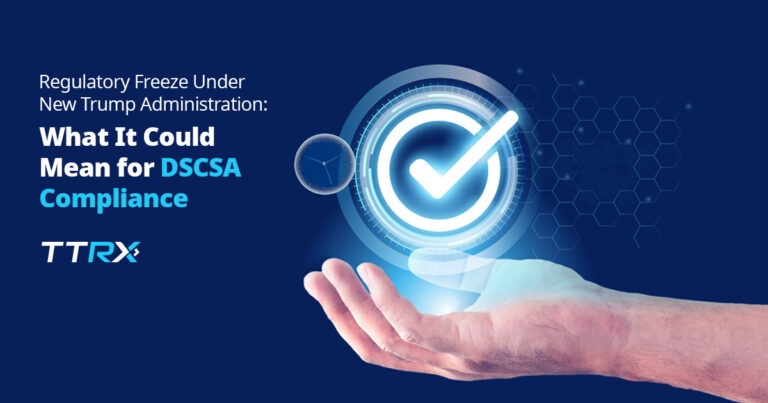Members of the drug supply chain in the United States breathed a collective sigh of relief as the serialization deadline that had been extended to November 2018 finally passed. For many, the process took several years to fully implement with plenty of challenges along the way.
2019
Members of the drug supply chain in the United States breathed a collective sigh of relief as the serialization deadline that had been extended to November 2018 finally passed. For many, the process took several years to fully implement with plenty of challenges along the way. Now, with the deadline out of the way, pharmaceutical companies feel that they have a little bit of breathing room to prepare for the next phase.
While there isn’t a deadline looming in the early part of 2019, it’s important that drug supply chain members not allow themselves to become too relaxed about meeting the requirements of the DSCSA. The industry as a whole still has major goals to work towards in the coming year as they work on winding up the second phase of the item serialization process and head into the final stages of serialized traceability implementation.
“It’s important to understand what the next phase of implementation entails and how trading partners can start working now to meet the expectations of the FDA under the DSCSA.”
Phases of DSCSA Implementation
The Drug Supply Chain Security Act, which was initially set into action is 2013, outlines a 10 year process leading to complete implementation of serialization and traceability standards by 2023. This process is a tremendous undertaking for the drug supply industry, which is why the FDA has broken it down into manageable stages with plenty of guidance and oversight along the way.
One of the biggest hurdles towards implementation was the November 2018 deadline for DSCSA serialization enforcement. Now, with that deadline in the past, It’s important to understand what the next phase of implementation entails and how trading partners can start working now to meet the expectations of the FDA under the DSCSA.
In 2019 we’ll see phase two of DSCSA implementation begin to wrap up with a November deadline that demands serializations requirements for wholesale distributors.

What the November 2019 Deadline Means for Wholesale Distributors
According to the requirements for the next phase of DSCSA implementation, wholesale businesses that operate within the drug supply chain must follow certain protocol. This includes participating only in the buying or selling of pharmaceutical products that have been properly serialized and verifying product identifiers on sealed homogenous cases or on saleable units.
Compared to the 2018 serialization requirements, the DSCSA authentication and verification demands placed upon wholesalers in 2019 appears on the surface to be less of a challenge. Still, as we approach the deadline – which is now less than a year away – new challenges are bound to emerge.
To make the process less burdensome on the company’s overall operations, here are a few things for wholesalers to keep in mind as they prepare for the year ahead and the 2019 DSCSA deadline.
Verification Requirements
As a wholesaler, any shipment you receive from a pharmaceutical supplier after November 2019 must be verified using the serial number, barcode and any other additional identifying data. Any discrepancy, such as an error in the National Drug Code (NDC) number or quantity will demand that a specific process for quarantining the product or sending it back will be required, except in instances where a non-labeled product has been grandfathered.
With less than a year until enforcement, wholesalers should begin working on how they will receive and track serialized product and begin the implementation process sooner rather to identify challenges and help employees through an unavoidable learning curve.
Explore Technology Solutions for Saleable Returns
Once the November 2019 deadline hits, wholesalers will be required to verify the product identifier on any returned product that they have the intention of reselling. One of the key components of the 2019 verification and authentication requirements is that wholesalers will not be able to resell any pharmaceutical product unless they are able to supply accurate, compliant documentation beforehand.
This process will prove to be rather complex, considering that records will need to include all identifying data from the manufacturer as well as the source of the returns. Wholesalers should begin looking into technology solutions that will streamline the process for recording all necessary data for returns so that they’re able to efficiently produce any required documentation for resale purposes.
Data Storage
Traceability and serialization data is the primary element that connects all members of the drug supply chain. As a wholesaler, your ability to manage this data is a critical component in your ability to meet the demands of the DSCSA. Building a system to manage this data is also one of the biggest challenges you’ll encounter on the road to compliancy.
Now is the time to begin looking at how data is handled within your wholesale company. For instance, you’ll want to implement one central storage repository for data. This includes a system for verifying, storing and exchanging the NDC or GTIN with other trading partners in the drug supply chain. When developing this system, it’s important to keep flexibility in mind. We are currently only half way to complete DSCSA implementation, which leaves plenty of room for amendments and modifications. Likewise, you’ll also want to consider your own growth as a wholesaler and invest in a data storage system that will eliminate growing pains along the way.
Don’t Expect Leniency
While the FDA was willing to issue a one year extension on the enforcement of their 2017 deadline, it’s unlikely that wholesalers will be granted the same leniency when November 2019 comes around. This deadline demands that wholesalers not only commit to accepting and selling verified products that contain the appropriate identifiers, they must also have a complete system in place for gathering data and validating the returns process. At the beginning of 2019, proactive wholesalers should already be invested in the process of meeting these goals.




